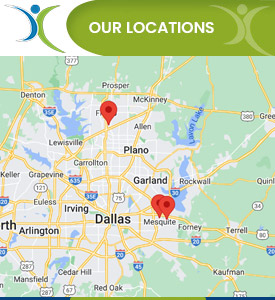Exploring the Root Causes of Scoliosis Pain
Dr. Andrew Morchower at OmniSpine Pain Management specializes in diagnosing and treating the underlying causes of scoliosis pain. Scoliosis, characterized by an abnormal curvature of the spine, can lead to discomfort and mobility issues. Dr. Morchower employs a comprehensive approach that combines physical examinations with advanced imaging to identify the root causes of pain. For more information, contact us today or book an appointment online. Our clinics are located in Frisco, TX, Sunnyvale, TX, and Mesquite, TX.


Table of Contents:
What is the connection between scoliosis and nerve pain?
How does the degree of scoliosis affect pain?
Can scoliosis pain be caused by muscle imbalances?
Can scoliosis pain affect other parts of the body?
At OmniSpine Pain Management, our team understands the complex relationship between scoliosis and nerve pain, and we specialize in providing advanced solutions for patients affected by both. Scoliosis is a condition marked by an abnormal sideways curvature of the spine, which can sometimes lead to nerve pain—a connection that is crucial to recognize for effective treatment.
When the spine curves, the vertebrae may rotate or shift, sometimes narrowing the spaces (foramina) where nerves exit the spinal column. This narrowing, known as foraminal stenosis, can compress the nerves, resulting in neuropathic pain. Patients with scoliosis-related nerve pain may experience a variety of symptoms, including sharp, burning, tingling, or shooting sensations that radiate along the path of the affected nerve. Depending on the location of the spinal curvature, this pain may be felt in the back, buttocks, legs, or arms.
We see that the severity of nerve pain varies from person to person. Mild cases of scoliosis may not cause significant nerve involvement, but more advanced or rapidly progressing curves can increase the risk of nerve compression. Alongside pain, symptoms such as numbness, weakness, or loss of coordination in the limbs may also occur.
Our approach at OmniSpine Pain Management focuses on thorough evaluation and individualized treatment plans. We use a combination of advanced diagnostic tools and minimally invasive therapies to manage both the spinal curvature and its associated nerve pain. Our goal is to relieve discomfort, restore function, and improve the quality of life for our patients.
For those with severe scoliosis—typically curves above 40 to 50 degrees—the risk of experiencing persistent pain tends to increase. A pronounced spinal curve can place extra stress on the muscles, ligaments, and joints of the back, potentially leading to chronic pain, stiffness, and even radiating symptoms if nerves are compressed. Severe scoliosis may also cause uneven weight distribution and altered posture, which can further exacerbate discomfort and functional limitations.
We recognize that the relationship between scoliosis severity and pain is complex. Some individuals with severe curves experience minimal discomfort, while others with mild scoliosis may have significant pain. Factors such as age, overall health, spinal flexibility, muscle strength, and coexisting spinal conditions all affect the pain response.
That’s why our approach at OmniSpine is highly individualized. Our specialists perform comprehensive evaluations to understand each patient’s unique circumstances and develop personalized pain management plans. Whether you are experiencing mild discomfort or severe, chronic pain due to scoliosis, our team is dedicated to improving your quality of life with the latest, evidence-based pain management strategies.
At OmniSpine Pain Management, we recognize that scoliosis pain is often linked to muscle imbalances. Scoliosis, which is defined by an abnormal curvature of the spine, can cause the muscles on one side of the back to become overstretched and weak, while those on the other side become tight and shortened. This uneven muscle tension can lead to discomfort, fatigue, and persistent pain. Patients may also experience muscle spasms or increased strain after activity or prolonged sitting or standing, as the imbalanced muscles struggle to support the spine.
Over time, these muscle imbalances can add extra stress to the spinal joints and surrounding soft tissues, increasing the risk of ongoing pain and functional limitations. At OmniSpine Pain Management, our team is experienced in evaluating and treating the complex causes of scoliosis-related pain.
We provide comprehensive, individualized care plans that may include targeted physical therapy, stretching, and strengthening exercises designed to address muscle imbalances and relieve pain. Whether through advanced interventional techniques or customized rehabilitation programs, our goal is to help patients with scoliosis improve function, reduce discomfort, and enhance their quality of life.
Yes, scoliosis pain can affect other parts of the body beyond the spine. Scoliosis is a condition in which the spine curves sideways, often forming an “S” or “C” shape. This abnormal curvature can lead to muscle imbalances, uneven pressure on the joints, and altered posture. As a result, pain and discomfort may not be limited to the back alone.
Our specialists have seen how scoliosis-related pain commonly extends to the neck and shoulders. The uneven alignment of the spine can cause muscles in these areas to overcompensate, leading to tension and soreness. Misalignment of the hips is also frequent, which may result in pain radiating into the buttocks and legs. In some cases, scoliosis can compress nerves, causing symptoms such as numbness, tingling, or sharp, shooting pain that travels along the affected nerve—often into the legs, a condition known as sciatica.
Chronic pain and muscle fatigue from scoliosis can impact your ability to walk or stand for long periods, sometimes leading to discomfort in the feet, ankles, and knees. This is due to the body’s weight being distributed unevenly, which puts extra stress on certain joints and muscle groups. For more information, contact us today or book an appointment online. Our clinics are located in Frisco, TX, Sunnyvale, TX, and Mesquite, TX. We serve patients from Dallas TX, Frisco TX, Mesquite TX, Sunnyvale TX, Plano TX, Garland TX, Forney TX, Cedar Hill TX, Denton TX, Balch Springs TX, and surrounding areas.
Check Out Our 5 Star Reviews






